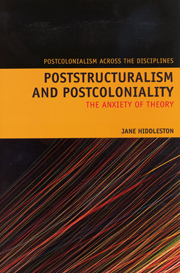Book contents
- Frontmatter
- Contents
- Acknowledgements
- Introduction
- Part One Poststructuralism in Algeria
- 1 Derrida in Exile: Philosophy, Postcolonialism and the Call for a Singular Universalism
- 2 In or Out? The Dislocations of Hélène Cixous
- 3 Lyotard's Algeria: Theory and/or Politics
- Part Two Theory and Cultural Difference
- Conclusion
- Bibliography
- Index
3 - Lyotard's Algeria: Theory and/or Politics
from Part One - Poststructuralism in Algeria
- Frontmatter
- Contents
- Acknowledgements
- Introduction
- Part One Poststructuralism in Algeria
- 1 Derrida in Exile: Philosophy, Postcolonialism and the Call for a Singular Universalism
- 2 In or Out? The Dislocations of Hélène Cixous
- 3 Lyotard's Algeria: Theory and/or Politics
- Part Two Theory and Cultural Difference
- Conclusion
- Bibliography
- Index
Summary
While Derrida and Cixous were born in Algeria and explore a personal sense of ‘postcolonial’ displacement from their origins in their autobiographical writing, Jean-François Lyotard lived in Constantine, Algeria, only temporarily between 1950 and 1952. His theoretical writing on Algeria is less concerned with the inscription of the self into theory than with contemporary Algerian politics, and with the invention of a language capable of conceptualising the position of a people on the verge of decolonisation. Lyotard's anxiety is not so much bound up with the voice of the theorist, with the theoretical self and its relations with others, as with the type of idiom necessary to conceive, and achieve, the invention of a new nation. As a result, Lyotard's writing on Algeria in a sense expresses a more specific unease than that of Derrida or Cixous: his concerns are entirely bound up with the Algerian revolution and with the language of political change. The Algerian essays deserve attention here, then, above all because they introduce the pressing problem of theory's relation to the political at a time of postcolonial upheaval. Lyotard's many multifarious musings on the war raise the question of how poststructuralism and its precursors meet the challenge of anti-colonial critique, as well as demonstrating the increasingly precarious position of Marxism in French thought at the dawn of the postcolonial era.
- Type
- Chapter
- Information
- Poststructuralism and PostcolonialityThe Anxiety of Theory, pp. 77 - 96Publisher: Liverpool University PressPrint publication year: 2010



